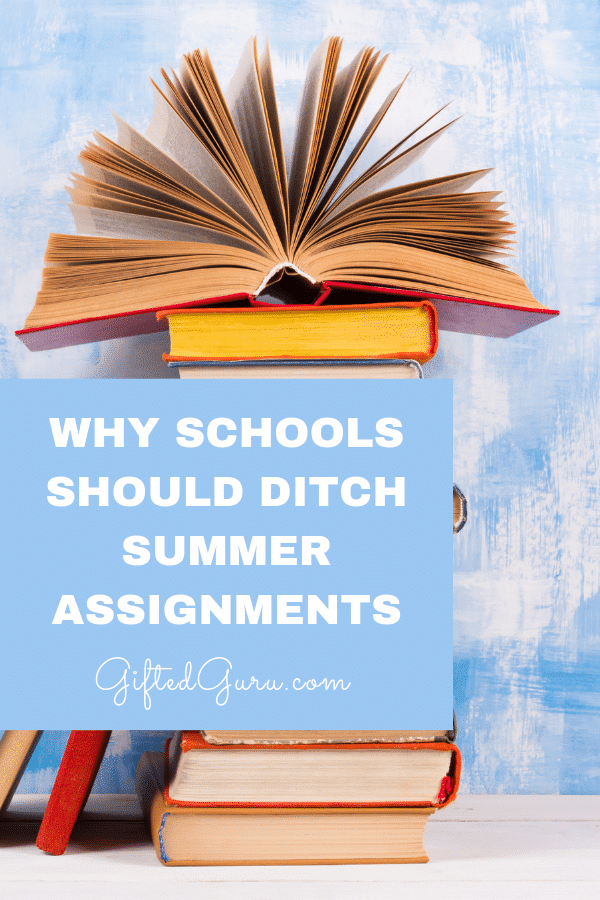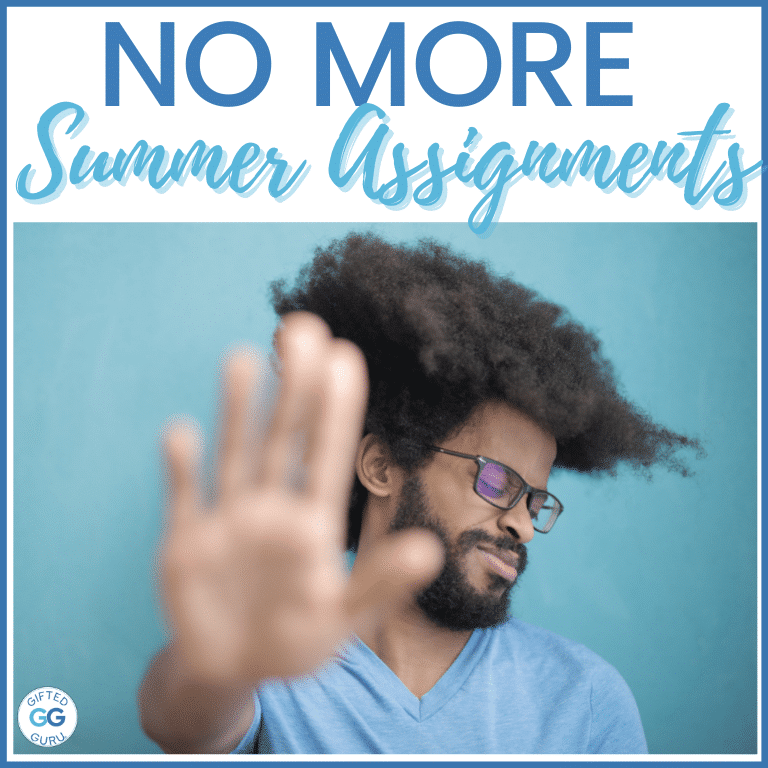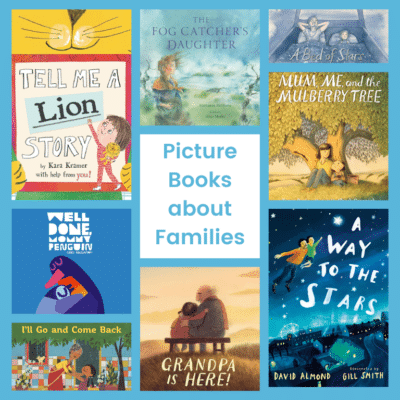It’s summer vacation where I live right now (shout out to my Southern Hemisphere peeps in the middle of winter), but if you peek over the shoulder of tens of thousands of students theoretically on vacation right now, you’d never know it.
All over, instead of being outside climbing trees or curled up in a comfy chair with the latest book in their fave series or even just doing nothing, kids are hunched over summer assignments that range from math packets to required reading.
I did a quick search for summer math and reading assignments, and they were everywhere.
I found that a district very near me had an elaborate summer reading assignment. Here’s how they explained it:
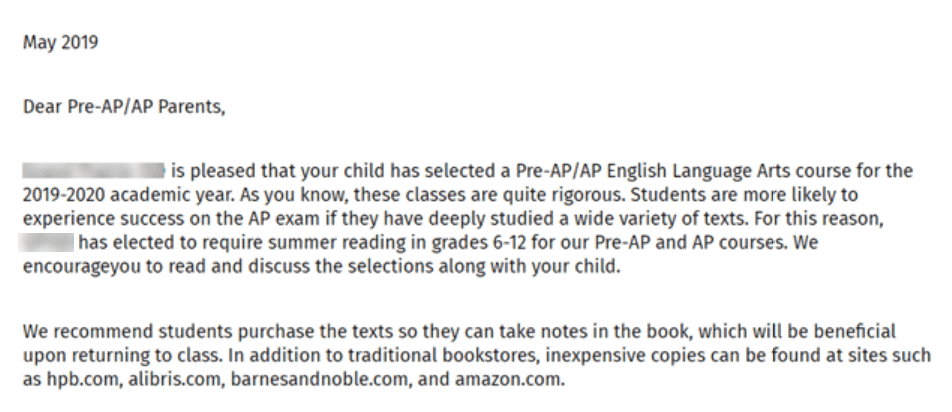
Stop. Just stop.
Summer assignments should be stopped. Immediately. Here’s why:
1. Summer is…wait for it…a vacation.
It is a needed rest from required learning. Summer assignments interrupt that rest and make a mockery of the word “vacation.”
Do I mean that students shouldn’t learn anything during the summer? Absolutely not! What I mean is that what they learn should be far more interest-driven than is possible with assigned tasks.
In addition to students needing a break from assigned work, families need a break, too.
Parents need a break from having to constantly be on their kids to get work done. Sometimes as teachers we forget what a struggle this is. Let’s remember.
When schools assign summer work, they disrupt the home and increase tension unnecessarily. No benefit is worth that.
The needs of the family always trump the needs of the school because families are forever. Nothing at school should ever be designed to knowingly and inevitably create contention in the home. This is doubly true when it’s completely unnecessary and even counterproductive.
2. It’s unfair to students whose families move during the summer.
So, I move into a new school for 9th grade only to find that I was supposed to read A Tale of Two Cities during the summer.
Great.
Now, not only do I feel behind before I even begin, I may even feel that I don’t belong in the advanced class. Guess I’ll just take regular English instead of pre-AP (or whatever it’s called in your area). #impostorsyndrome
This is a particular issue for children from less advantaged backgrounds because they are more likely to move.
Here’s what the district near me says is expected with regard to summer reading and when it’s due:
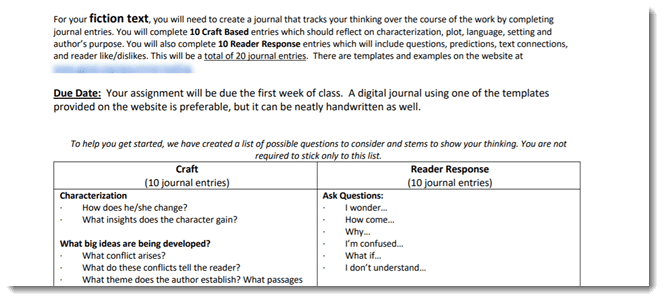
Interestingly, over 30% of this district is in bilingual or English Language Learner programs and over 70% are economically disadvantaged.
It seems reasonable to consider that if a parent has several children, each of whom need two books, and that parent’s own English skills are emerging, this could be a severe burden.
For my own kids, theoretically, there was supposed to be a Tale of Two Cities test right when school started in 9th grade (see reason #3 below). Because so few students had read and understood it, the teacher had to delay it and delay it or risk having half of the class fail. This happened year after year.
Because of this dynamic, teachers end up having summer work flow into the school year, making the beginning of the year more stressful and burdensome to both students and teachers than it needs to be.
Or, teachers give up on the test altogether, creating mistrust on the part of the students who wasted spent their summer vacation on a useless assignment.
It is not a stretch to call this an equity issue.
3. The assignments are usually not even quality work.
As mentioned in #2 above, when my sons were entering high school, all of the 8th graders were expected to read A Tale of Two Cities on their own. They were supposed to highlight passages with one of four prescribed highlighter colors. Oh, please.
They’re not going to get anything out of it like that, and they’re probably just going to do read the Spark Notes anyway. What a waste.
If you look up, “How to Get Kids to Hate a Book in Three Easy Steps,” this is what it says to do:
- Make a student read a book before they are even your student and you have zero clout with them, nor do you have even the beginning of a relationship.
- Make the book a challenging read for him/her.
- Make the reader take notes and highlight with four (exactly four, no more, no fewer) colors.
- Give a test on the book the first time you see the whites of their eyes.
Math packets? Same.
I found a summer math packet, and the word art doesn’t make it any more cool, sorry.

Here are the instructions for completing the packet:
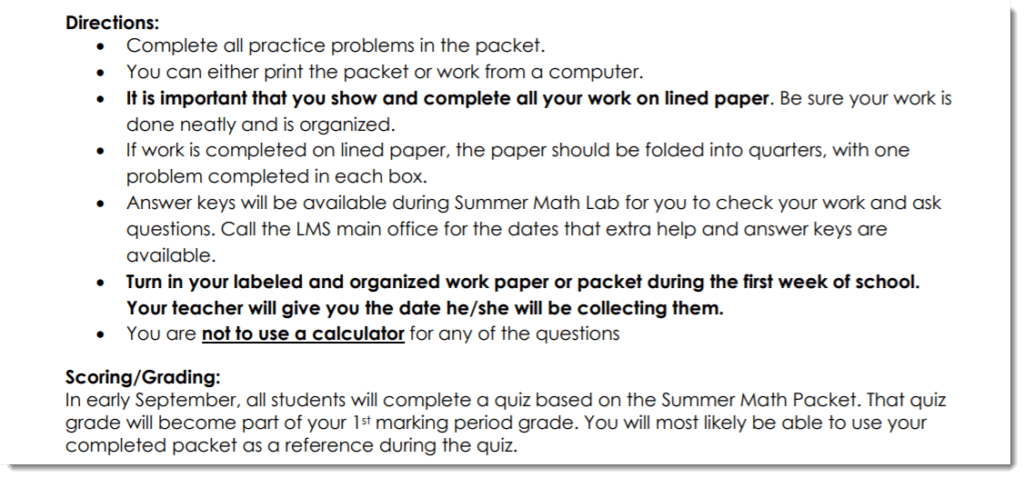
Did this catch your eye? “You are not to use a calculator.” I bolded it, but they bolded AND underlined it. They mean it. Kind of.
Newsflash: kids given summer math assignments will use a calculator. Not only will they not really get the practice the teachers were hoping they would, but they are also creating a pattern of cheating (or at least ignoring teacher guidance).
Genius move.
Very few teachers create engaging work for students to do during the summer, and the same teachers who complain about professional development they are required to complete during the summer gleefully give out hours and hours of work to their students. That’s called hypocrisy.
Here’s the summer reading assignment choices for incoming 9th graders:
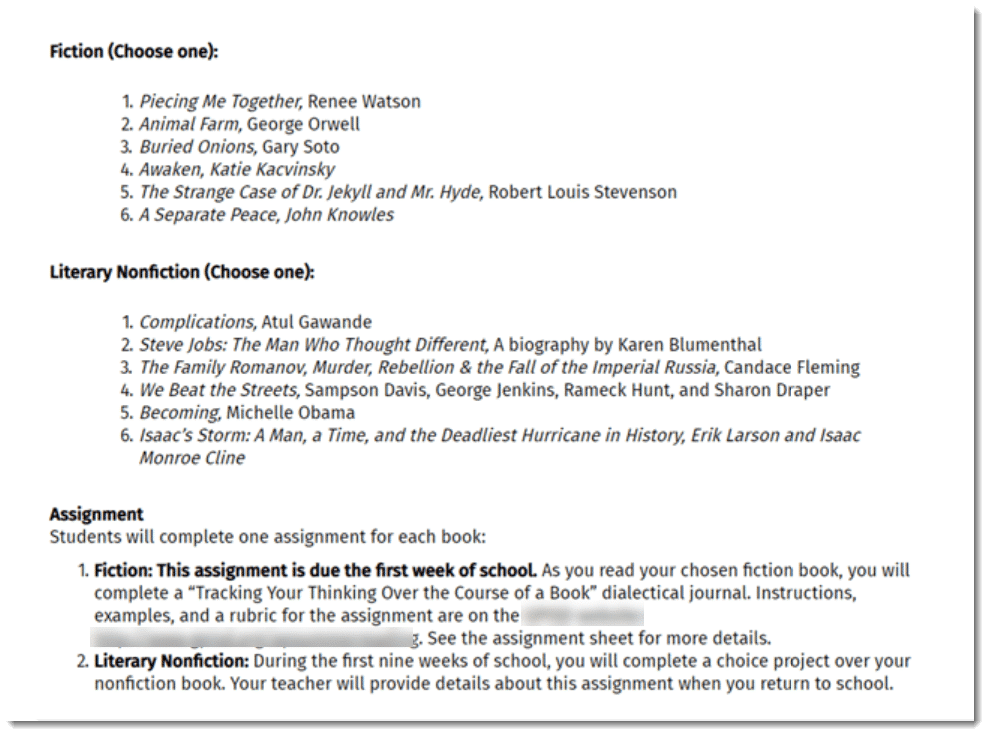
I love to read. Love to read. And yet, when I read through the summer reading assignment, I felt tired. That’s not what we’re aiming for.
4. DIY learning is often shallow.
One of quotes that guided and informed my own teaching practice is this statement from poet William Wordsworth: “What we have loved, others will love, and we will teach them how; instruct them how the mind of man becomes a thousand times more beautiful than the earth on which he dwells…”
Teachers don’t just instruct; they help students grow to love the learning.
As an English teacher, if my students don’t feel it in their gut when they think of The Great Gatsby years later, I failed, even if they can tell you the themes and analyze the characters.
With summer assignments, the teacher isn’t there to instill the love essential to growing life-long learners, not just completers.
In the summer reading assignment I shared above, the assignments that students are supposed to complete cite teacher and author Kelly Gallagher (meaning that they used his questions and ideas to create their assignment).
I found this incredibly ironic because Gallagher himself has gone on record as being opposed to this kind of assigned summer reading:
“Paradoxically, say Gallagher, there is a flip side to over-teaching a book—under-teaching it. For that reason, Gallagher didn’t assign his students The Grapes of Wrath as summer reading; young readers need help in understanding many of the books in the canon.”
Here’s what the incoming 9th graders were supposed to read:
Animal Farm. Animal Farm. On their own. At thirteen or fourteen. What a waste of Orwell, and what a horrible thing to do to a child. Take a novel that could inform his or her view of government forever and make it nothing more than a shallow, unappealing task.
Remind me again why we do this?
Oh, yeah! It’s so kids will be ready for the work in the fall. They’ll be nice and sick of it before it even begins. That’s great!
The alternative:
Create summer learning lures.
You May Also Like:
- The Problem With Reading Logs
- Why Children Stop Reading And What To Do About It
- 8 Benefits of Reading Classic Literature

